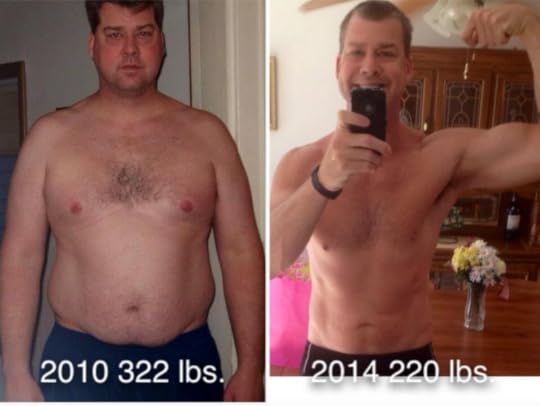William Davis's Blog: Dr. Davis Infinite Health Blog, page 144
February 28, 2015
JoCarol went OFF the Wheat Belly lifestyle!

JoCarol passed on her curious tale of having engaged in the Wheat Belly lifestyle, losing a substantial quantity of weight, only to return to a wheat/grain lifestyle and regain the weight and more.
To the left is JoCarol after having lost 33 pounds following the Wheat Belly lifestyle, while on the right is after she went back to wheat and grains and gained nearly 60 pounds.
Of course, the Wheat Belly lifestyle is about a lot more than weight issues, so I also fear for JoCarol’s health with such an extravagant regain of weight. We are advised by “official” providers of nutritional advice that “healthy whole grains” are part of a weight control effort. This, of course, is blatant nonsense, as experiences like this demonstrate.
Lose the wheat, lose the weight. Eat the wheat, gain a ton of weight. Simple. Thankfully, JoCarol tells me that she has learned from this experience is now back on course.
Here is JoCarol at the very start of her Wheat Belly adventure before the top left photo.
The post JoCarol went OFF the Wheat Belly lifestyle! appeared first on Dr. William Davis.
Fifth Estate defends wheat

“No, Congressman, there is no evidence that cigarette smoking is associated with cardiovascular disease and cancer.”
Such was the testimony offered by Big Tobacco executives during Congressional hearings on the subject throughout the 1980s and 1990s, denying even to this day that nicotine is addictive, that they increased nicotine content to encourage addictiveness, and that they crafted marketing strategies, such as the Joe Camel cartoon, to target children.
So it should come as no surprise that the Fifth Estate uses similar tactics in what amounts to a defense of the wheat and grain industry.
To say that there is no evidence implicating wheat and grains in human diseases is to ignore evidence that continues to grow, evidence associating wheat/grain with a long list of health problems. For example:
Gliadin–The gliadin protein of wheat (and related proteins of rye, barley, and corn), if it remains intact, launches the first step in a complex process that leads to autoimmune diseases, an effect not confined to people with celiac disease but occurs to varying degrees in 90% of people who consume wheat and grains. Intact gliadin underlies, for example, neurological diseases such as cerebellar ataxia and some forms of dementia. Gliadin and other wheat components such as trypsin are likely culprits in (the poorly named) non-celiac gluten sensitivity associated with bloating, diarrhea, joint pain, and mind “fog.”
If gliadin is partially digested (an example of the incomplete digestibility of grain proteins by humans) to peptides, such as the A5 pentapeptide, it can also act as an opiate with adverse effects in people with schizophrenia, autism , bipolar disorder , stimulation of prolactin and thereby breast tissue growth, and others (though it is not entirely clear in these conditions how much of the effects are due to intact gliadin with autoimmune effects and how much are due to the opiates that derive from partial digestion).
Tellingly, because of the extensive health problems associated with gliadin, a number of research groups are working to genetically engineer gliadin, telling us that the problems with gliadin are widely understood by the agricultural science community, despite the overt denials of any knowledge of problems with wheat and grains.
Wheat germ agglutinin–Wheat germ agglutinin, WGA, is a perfect example of the indigestibility of grain proteins. In its passage from mouth to anus, WGA is entirely impervious to human digestion. But, en route, WGA exerts a number of unhealthy effects, including direct bowel toxicity, blocking the digestive hormone cholecystokinin, and is suspected to block leptin, the hormone of satiety (telling when to stop eating).
Phytates–Block absorption of any positively-charged ion, particularly iron, zinc, and magnesium, a well-characterized feature of grains. Iron absorption is as much as 90% blocked with the phytate content of a bagel.
Amylopectin A–The carbohydrate of grains, amylopectin A, uniquely susceptible to digestion by the salivary and stomach enzyme, amylase, explains why wheat and other grains have among the highest glycemic indexes of all foods, higher than table sugar, higher than a Snickers bar, and on a par with jelly beans. A diet centered around high-glycemic index foods thereby causes growth of visceral inflammatory fat, insulin resistance, higher blood sugars, diabetes, hypertension, heart disease, cancer, and dementia.
We also know that wheat and grains change bowel flora and oral flora, effects that have far-reaching implications for health, including bowel regularity, irritable bowel syndrome and inflammatory bowel diseases, as well as autoimmunity.
This is a partial list of the evidence damning wheat and grains as the most destructive addition to the human dietary experience, with problems now amplified by changes introduced by agribusiness, herbicide/pesticide residues, and the repeated urgings to make them the cornerstone of diet. (Additional discussion and references can be found in Wheat Belly Total Health, including 40 pages of scientific references.)
Throw on top of the evidence what we are witnessing in social media and the broad societal experience: people getting off long lists of medications, getting rid of many health conditions, even undergoing some pretty significant changes in appearance beyond that permitted by weight loss. This movement is most definitely not growing because of my powers of persuasion nor charisma; it continues to grow because it works.
So to argue that there is no evidence to back the arguments that wheat and grains are huge mistakes in the human diet is simply untrue. But it is how industry (and their manipulated or unwitting media outlets) typically wages damage control: claim that no evidence exists in the face of what I would regard as overwhelming evidence to the contrary.
I don’t know if the hidden agenda was to defend the huge Canadian wheat export industry (Canada is the world’s #1 wheat exporter), to maintain the wheat franchise of Big Agribusiness companies such as Cargill, to save face for grain-promoting Health Canada, or to just create provocative headlines, but what was clearly absent from their broadcast was a serious consideration of the science documenting the adverse health implications of consuming what I could characterize as the most awful thing ever passed off as “food.”
The post Fifth Estate defends wheat appeared first on Dr. William Davis.
February 26, 2015
Georgann gets rid of acid blocking medication

Tens of millions of people take prescription and over-the-counter drugs to suppress stomach acid production. Such drugs are the third most commonly prescribed drugs in the nation.
It is very common for people who engage in the Wheat Belly lifestyle to obtain relief from acid reflux/heartburn/esophagitis within several days of kissing their last bagel or bowl of bran cereal goodbye. But what to do with the acid blocking drugs that you may have been taking?
Georgann shares her experience with the Wheat Belly lifestyle and getting off acid reflux drugs.
I am reading the new book, Wheat Belly Total Health, and I had to send you a note.
Before I found Wheat Belly, I had been taking Prevacid for over 10 years. I couldn’t go more than 48 hours without it or I would be in terrible pain, pain beyond regular acid discomfort. Even after dropping wheat, it hurt terribly.
I got online and discovered others reporting severe withdrawal from these type of drugs. Determined to be drug-free, I weaned off of it. This involved going from prescription level to over-the-counter, then spreading that out until I could step away from it.
My new doctor, the very informed man who led me to your work, was amazed when I told him I broke the addiction.
I just want to say thank you so much for helping me be drug-free and giving me back personal responsibility for my own health. This is the first year in my 51 years I have not used an antibiotic for anything. I have returned to my homesteading, seasonal eating, and organic food roots from childhood. Life is better everyday. My heart goes out to those who have become dependent on acid blockers. Those drugs are an evil lie: just because you are not in pain does not mean you are well. Thanks again and keep changing lives!
Getting off such acid blocking drugs is a real plus for Georgann’s health. Taking such drugs increases likelihood of a number of health problems, including:
Dysbiosis–Suppressed stomach acid changes bowel flora in unhealthy ways. Disruption of bowel flora composition cascades into other health consequences, such as body-wide inflammation, increased potential for autoimmune diseases, disrupted bowel habits, and increased risk for bowel cancer. While typically a post-antibiotic problem, acid blockers also raise the likelihood of overgrowth of Clostridium difficile, a very toxic organism that causes life-threatening intestinal infections.
Vitamin B12 and iron deficiencies
Osteoporosis, osteopenia, and bone fractures
Pneumonia–the lack of stomach acid allows the stomach (normally a nearly sterile organ) to become colonized with bacteria. Reflux of stomach contents, e.g., during sleep, seeds the airways and lungs, leading to infections.
Failed recovery of stomach acid production when the drug(s) are stopped (hypochlorhydria and achlorhydria).
Potential for problems are compounded by the fact that most people take these acid blocking drugs for extended periods, typically many years, while sometimes even taking more than one form (e.g., prescription drug + over-the-counter drug) for inadequately treated symptoms, which is common.
Georgann removed the cause of so much gastrointestinal disruption–wheat and grains–no longer needing the drug to suppress this effect. But, as her experience demonstrates, many people experience an acid producing “rebound” effect, i.e., a period of increased stomach acid production when the drug is stopped. She did the right thing: wean the drug off over an extended period.
Additional efforts to help you get off these drugs, as well as to know what to do with hypo- or achlorhydria, can be found in an extended discussion in Wheat Belly Total Health.
The post Georgann gets rid of acid blocking medication appeared first on Dr. William Davis.
Marcella turns the clock back with her Wheat Belly lifestyle

Marcella posted these photos and comments about her life-changing experience following the Wheat Belly lifestyle:
The Wheat Belly lifestyle has saved my life. I’ve been sick for years. I’m down 76 pounds, 36 more to go, but the best part is I’m alive. I got to a point where I couldn’t even drink a glass of water. I was dying. It scared my husband and family.
I’m truly blessed to have found this lifestyle. I now eat to live, not live to eat.
Not only did Marcella recover from her ill health and lose an extraordinary amount of weight, but look at how vibrant and young she looks in her “after” photo: thinner, yes, but there’s clearly a lot more going on here than just weight loss. Had she posted these photos and said the “before” photo was her mom and the “after” photo was the daughter, I would have believed it!
Marcella’s experience reflects another fascinating aspect of the Wheat Belly lifestyle: its capacity to turn the clock back on your physical appearance. The loss of facial edema and eye puffiness, the sharpened facial contours, the greater ease of gaining body-wide muscle (lost as we age), the heightened flexibility and ease of motion all add up to giving you the appearance–and feel–of someone much younger.
The post Marcella turns the clock back with her Wheat Belly lifestyle appeared first on Dr. William Davis.
February 25, 2015
Wheat Belly public TV special to blast across U.S.!
 Wheat Belly Total Health public television special
Wheat Belly Total Health public television specialThe Wheat Belly Total Health Public TV Special will be airing about 300 times in cities across the U.S. over the next 3 weeks.
Among the cities:
California–Los Angeles, Fresno
Colorado–multiple cities
Florida–Miami, Tampa
Georgia–multiple cities
Illinois–Champaign
Indiana–Fort Wayne
Mississippi–multiple cities
North Carolina–multiple cities
Ohio–Cincinnatti
Tennessee–Chattanooga
Texas–Houston
Vermont–multiple cities
Washington–Seattle, Yakima
Wisconsin–multiple cities
Wyoming–multiple cities
The Wheat Belly Total Health Public TV Special is the great persuader! It can help persuade a reluctant spouse or family that there are a long list of benefits obtained by following this lifestyle and that it is entirely doable.
Consult TV listings in your area for channel and times.
The post Wheat Belly public TV special to blast across U.S.! appeared first on Dr. William Davis.
Mina shows off her weight loss but experienced a HEALTH transformation

Just look at Mina’s fabulous 1-year Wheat Belly success.
53 lbs down and counting. “Before” pic is from March, 2014 and “after” pic is Feb, 2015. You can see the weight loss.
What you can’t see is the drastic improvement in my health. My joints don’t ache anymore, no more skin rashes, bloating, or hair loss. I’m 34 years old, have 3 kids, and have never felt better! All thanks to Dr. Davis and his wonderful work.
She makes a crucial point: we show off all the weight loss transformations, but some pretty darned spectacular health transformations typically accompany the lost pounds–we just can’t show them, at least not easily. I suppose we could show a colonoscopic photograph of a healed colon after years of taking an inflammatory beating from grains, but I doubt most of you would want to see that.
Nonetheless, Mina’s improved skin, gastrointestinal, and hair health reflect the reduced/eliminated inflammation, relief from gastrointestinal disruption, reversal of impaired nutrient absorption, and other health benefits from not eating the awful seeds of grasses, AKA “grains.” Yes: by not eating the food that government agencies, dietitians and providers of dietary advice all urge us to eat more of, we recover health in some pretty spectacular ways while being able to look sleek and trim like Mina while wearing high heels.
The post Mina shows off her weight loss but experienced a HEALTH transformation appeared first on Dr. William Davis.
Sydney no longer needs sweat pants

Sydney shares her 2-month Wheat Belly experience with us:
Left is my “before”: 5′ 1″ 160 lbs, a size 12 (tight size 12, sweat pants were my best friend). Tired, bloated, heartburn, acid reflux. Just look at that ginormous gut! (No, don’t look!, too awful.)
And on the right is now, wheat, all grains, and sugar-free since January 2nd of this year, down to 127 pounds. I lost an initial 20 lbs. losing just the wheat, the rest came off after I gave up all grains and sugar, as well.
Counting calories will not provide relief from fatigue. Pushing the plate away will not get rid of heartburn or acid reflux. Eating smaller portion sizes will not reverse inflammation. This is why the Wheat Belly lifestyle is so effective: it accomplishes all those things and more, as well as substantial weight loss.
After all, it’s not really weight loss we are after, but recovering our health–weight will follow.
For similar reasons, if weight loss eludes you on this lifestyle, it’s not because it does not work; it’s because there remains something wrong with your health. Discussions about such health issues that block weight loss can be found in the Wheat Belly Blog videos, as well as an extended discussion–with solutions–in Wheat Belly Total Health.
The post Sydney no longer needs sweat pants appeared first on Dr. William Davis.
February 24, 2015
Rob lost about 1/3 his body weight on the Wheat Belly lifestyle

Rob shared his Wheat Belly lifestyle experience, demonstrating a dramatic transformation in body appearance and composition:
I’m a fervent proponent of the wheat-free lifestyle, which I adopted full time in 2011 (except for an odd pizza or cupcake a few times a year). To date, I’ve lost 104 pounds.
My challenge now is to transition my children from wheat to this healthful and sustainable lifestyle!
Though he doesn’t mention it, you can be sure that Rob also experienced dramatic improvements in multiple aspects of health. Among the more prominent effects that people experience over time, especially a sustained and fairly consistent effort such as that followed by Rob:
Reduced inflammation–reflected by reduction in measures like c-reactive protein(CRP)–no, you do not need a statin drug to reduce CRP, even though that is what most doctors tell you.
Improved cholesterol panel–Rob can expect a dramatic increase in HDL, reduction in triglycerides, and reductions in real measured LDL values (such as NMR LDL particle number or apoprotein B, though with variable effects on the fictitious LDL cholesterol value, since it is calculated, not measured, with assumption built into the calculation that are largely invalidated by this lifestyle).
Reduced blood pressure
Reduced stress on weight-bearing joints–especially hips and knees
Reduced potential for glycation–i.e., the glucose modification of proteins that is irreversible and leads to such health phenomena as cataracts, hypertension, coronary disease, stroke, cancer, and dementia.
Reduced insulin–and restored responsiveness to insulin, furthering the anti-inflammatory benefits.
Improved nutrient absorption–particularly iron, zinc, magnesium, and vitamin B12 (due to loss of phytates from grains)
Reduced gastrointestinal disruption–that translates into relief from acid reflux, bowel urgency/irritable bowel syndrome, and recovery of the potential to enjoy healthy bowel flora
Reduced potential for autoimmune diseases
Increased testosterone levels–along with reduced estrogen (due to receding effects of excessive aromatase enzyme activity in visceral belly fat) and reduced prolactin, reflected on the surface as more muscle and freedom from man breasts.
Note that the Wheat Belly lifestyle and experiences such as Rob’s do not involve extreme exercise, deprivation, calorie counting, or other contortions. The only bending or effort required in this lifestyle is the big windup you take in chucking conventional dietary advice into the trash where it belongs.
The post Rob lost about 1/3 his body weight on the Wheat Belly lifestyle appeared first on Dr. William Davis.
Newcomers: Enroll in the Wheat Belly 10-Day Grain Detox!
 I am looking for just a few more volunteers to enlist in our Wheat Belly 10-Day Grain Detox.
I am looking for just a few more volunteers to enlist in our Wheat Belly 10-Day Grain Detox.
In this program, I will personally help launch your program, with ongoing support provided by Rodale (my book publisher) support staff. We will show you just how to get started in the Wheat Belly program in a new and exciting 10-day rapid-start format, including discussions on:
How to shop
How to choose safe foods and avoid wheat/grain booby traps
What to expect
How to better deal with the opiate withdrawal process that develops
How to manage nutritional supplements to supercharge your success
We will chronicle your progress with photographs. There is no charge for participation, as we are simply looking to collect experiences for the new Wheat Belly 10-Day Detox book due out fall, 2015.
If you are interested and meet ALL of the following criteria (including able to come to NYC on March 19th & 30th):
• Age 25 to 55
• Have 15 to 50 pounds to lose
• Currently healthy–no existing chronic or acute medical conditions
• Willing/able to stick to a strict, but satisfying and delicious, food plan that eliminates grains for 10 days
• Willing/able to track your food for 10 days
• Willing to be interviewed and share details about your experience on the program and/or have your photo in a national magazine and/or a book
• Must be available to come to New York City for testing and orientation on the following dates:
Pre-testing weight, measurements, photos, orientation (about 3½ hours) Thursday, March 19th, between 9 a.m.-5 p.m.
Post-testing and photos (about 2 hours) Monday, March 30th, between 9 a.m.-3 p.m.
You need to be available both days in order to participate.
If you are interested in participating in this exciting project, go to this enrollment page (the web page for the project coordinator, Michele Stanten).
The post Newcomers: Enroll in the Wheat Belly 10-Day Grain Detox! appeared first on Dr. William Davis.
February 23, 2015
Thyroid: Ignorance, Neglect, Indifference

Dawn shared her thyroid experience that provides a wonderful encapsulation of many of the issues we encounter when we try to get thyroid health re-established:
I had a TSH of 3.9 for years, and they ALL said my thyroid was fine, then tried to give me antidepressants and told me to exercise more and sleep better. It made me so mad, because I knew I wasn’t depressed and I was exercising.
I finally found a functional doctor who tested all of them. Not only did my free T3 and T4 prove that I was indeed hypothyroid, but my antibodies showed I also had Hashimoto’s thyroiditis. Hmmm, imagine that: I wasn’t depressed, I didn’t need to exercise more, and trust me I was sleeping way more than I should have been. Now my numbers are optimal and I’m feeling so much better.
We just go along with whatever our doctors tell us, even though we know something is terribly, terribly wrong. At one point, I honestly thought I was going to die (felt so bad I sometimes wished I would). It was actually you and the wonderful people here that pushed me to get answers.
What is considered “normal” TSH is not optimal. Besides that, the TSH test doesn’t really tell you the whole picture of your thyroid. Your thyroid doesn’t make TSH. The only way to know if your thyroid is optimal is by testing free t3, free t4, reverse t3 and ideally your thyroid antibodies. You still need your Free T’s checked, even if your TSH comes back in normal range. By the way, optimal TSH is completely different than the “reference” or “normal” range. Most labs consider anything under 5 within range, when optional is below 2. Huge difference.
Conventional management of low thyroid hormone status, hypothyroidism, is defined by ignorance, neglect, and indifference, much like the 3 monkeys who see no evil, hear no evil, or speak no evil. The “rules” used to diagnose hypothyroidism by your primary care doctor or endocrinologist no longer apply in an age of heightened autoimmune disease risk triggered by the genetically altered forms of gliadin protein in wheat, disruption of bowel flora by numerous environmental and dietary factors, and the growing problem of endocrine disruption from industrial compounds. Just as using a yellow plastic dial analog telephone from 1970 would be laughably out-of-date in the age of sleek, microprocessor-driven, digital smartphones, so applying the rules of the 1980s to the modern landscape of thyroid dysfunction would be equally silly–except that your health is at stake and the answers are being dispensed by someone who purports to be an expert–your doctor.
In this new age with new challenges, some of which change every year as, for instance, the chemical and agribusiness industries release literally hundreds of new, untested chemicals into the soil, groundwater, food, and commercial products, the new rules for thyroid health have not yet been written. As Dawn points out, however, it is indeed possible to make sense out of thyroid status and work towards re-establishing something close to ideal thyroid status, even after the inciting autoimmune trigger–wheat and grains–have been removed and after disruptive factors–exposure to industrial chemicals–are not fully identified or understood.
As Dawn also points out, we should never accept:
“Your thyroid is fine” without actually seeing and getting a copy of the values (that you can share with us).
“Your TSH is fine” without, once again, actually seeing the value.
TSH as the sole measure. In this new age, it cannot be taken in isolation. (Even the full panel leaves some holes due to the larger problem of endocrine disruption at the hypothalamic, pituitary, and organ/tissue level, an issue for another day.)
Complete dismissal of thyroid symptoms such as depression, fatigue, inappropriately colds hands and feet, constipation, and thinning hair.
Cookbook medicine with the recipes written 30 or 40 years ago–when your doctor was educated before many of the problems of the new age declared themselves.
The post Thyroid: Ignorance, Neglect, Indifference appeared first on Dr. William Davis.
Dr. Davis Infinite Health Blog
Recognize that this i The insights and strategies you can learn about in Dr. Davis' Infinite Health Blog are those that you can put to work to regain magnificent health, slenderness, and youthfulness.
Recognize that this is NOT what your doctor or the healthcare system provides, as they are mostly interested in dispensing pharmaceuticals and procedures to generate revenues. The healthcare INDUSTRY is not concerned with health--you must therefore take the reins yourself.
Dr. Davis focuses on:
--Real, powerful nutritional strategies
--Addresing nutrient deficiencies unique to modern lifestyles
--Deep insights into rebuilding the microbiome disrupted by so many modern factors
Follow Dr. Davis here and on social media and you can witness the extraordinary successes people enjoy on his programs. ...more
- William Davis's profile
- 159 followers



